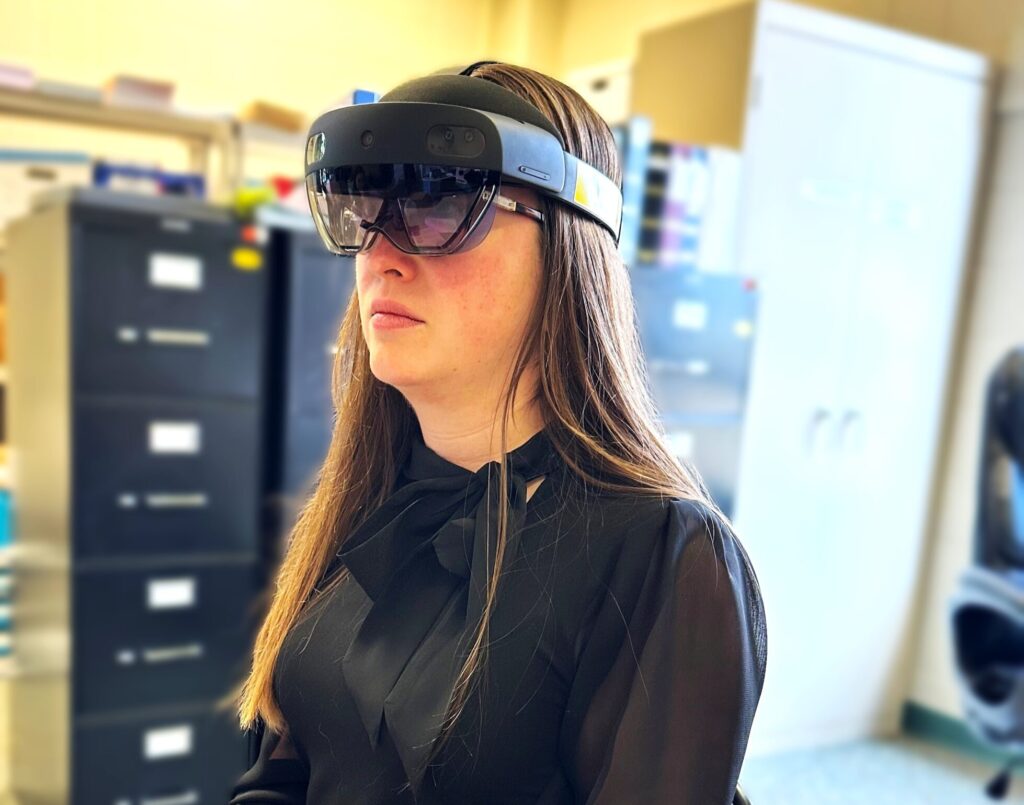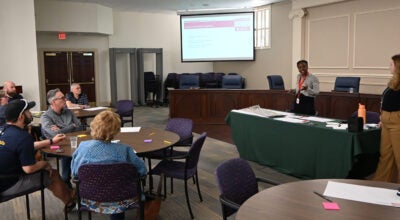Look out: New software helps track readers’ eye movements at Rowan County Literacy Council
Published 12:10 am Saturday, March 16, 2024

- Rowan County Literacy Council Program Coordinator Samantha Jones demonstrates how the ReadingXR headsets work. - Submitted
SALISBURY — The Rowan County Literacy Council is a local organization that strives for a community where all individuals can lead healthy, fulfilled lives of self-reliance and dignity. Thanks to a new arrow in its quiver, the organization is bringing advanced technology into the equation.
The council recently received a VR headset through a collaboration between the Dollar General Literacy Foundation and a tech company called ReadingXR. The headset tracks eye movements to calculate the wearer’s words per minute and other data on eye fixations and regressions.
Executive Director Laurel Harry said they would use the headsets as another diagnostic tool for the adult literacy program, in which there are more than 100 students.
The headset looks like a typical VR headset, but it utilizes software that displays passages for the user to read and then charts various data points regarding eye movement.
“It tracks the movement of the eyes across the page and in doing so, it is checking for the speed and its checking for any fixations or regressions,” Harry said. “A fixation is when you stop and really look at a word. Regression is when you go back and look at a word that you have already read or reread part of a line.”
Harry explained that the data points that are going to be the most useful are the words per minute and the comprehension.
“Each one of these tests has a comprehension segment at the end,” Harry said. “It’s essentially a little pop quiz. You read a passage and then when you are done there are some comprehension questions.”
Harry pointed out that the results of those pop quizzes can be skewed if the user has any prior knowledge of the topic, so for their purposes, using fictional passages works best.
The council’s adult student group features various individuals who are there for different reasons.
“What we have in the adult program is a combination of adult basic education students,” Harry said. “Those are people who either for whatever reason feel like their reading skills are not where they want them to be. Some never had enough one-on-one help as children so they have gone through life with inadequate reading capacity. They come to us later in life to improve those abilities.
“Some students are people who want to build up their basic literacy to focus on taking the GED test. The biggest chunk of our adults are (English as second language) students.”
Most of the council’s students meet with volunteers and tutors for 90 minutes per week.
“We retest adults in the program after every 50 hours of instructional time,” Harry said. “That is where this would come into play. We will use this in conjunction with our normal testing.”
Ted Dinsmore is the president and managing partner at SphereGen, a software development company specializing in healthcare IT solutions. SphereGen developed the ReadingXR software, which runs on the Microsoft HoloLens product.
The company is based in New Haven, Connecticut, and took the idea from a visagraph.
“One doctor said we used to have this thing in the 80s that we used with kids,” Dinsmore said. “It had wires coming out of it. Connected to a system. It was Frankenstein looking.”
Researchers and developers began working with doctors at Yale and a group from Europe that focuses on visualization with reading.
“It’s how people use their brains and look through their eyes while they are reading,” Dinsmore said.
While the concept has been around for a while, Dinsmore and his company wanted to make it easier for teachers and students to use, so they began exploring ways to scale its accessibility.
“The corporate sponsorship that created this was Microsoft, T-mobile and the Barbara Bush Foundation,” Dinsmore said.
Microsoft provided the hardware, T-Mobile allowed them to use their technological infrastructure, and the Barbara Bush Foundation ultimately led to the partnership with the Dollar General Literacy Foundation, which got the product into the Rowan County organization’s hands.
Dinsmore said those partnerships have been “effective” in getting this technology to the entities that really need them, which allows for screenings that were previously cost-prohibitive for many to now be relatively affordable and, in some cases, free.
To learn more about the Rowan County Literacy Council, visit its website at https://www.rcliteracy.org/.





